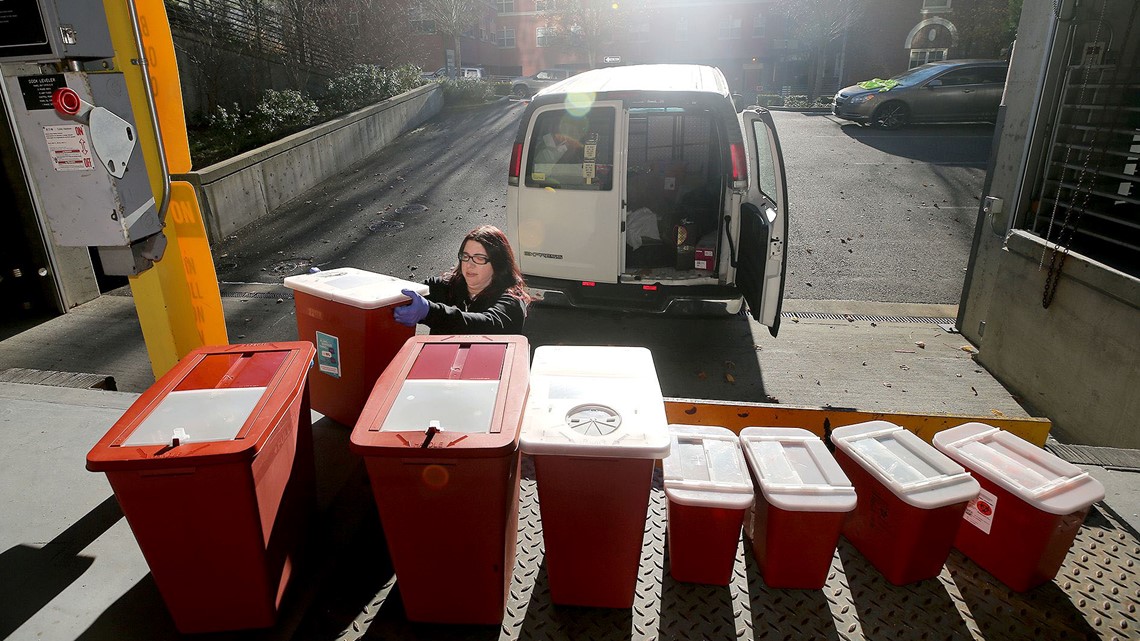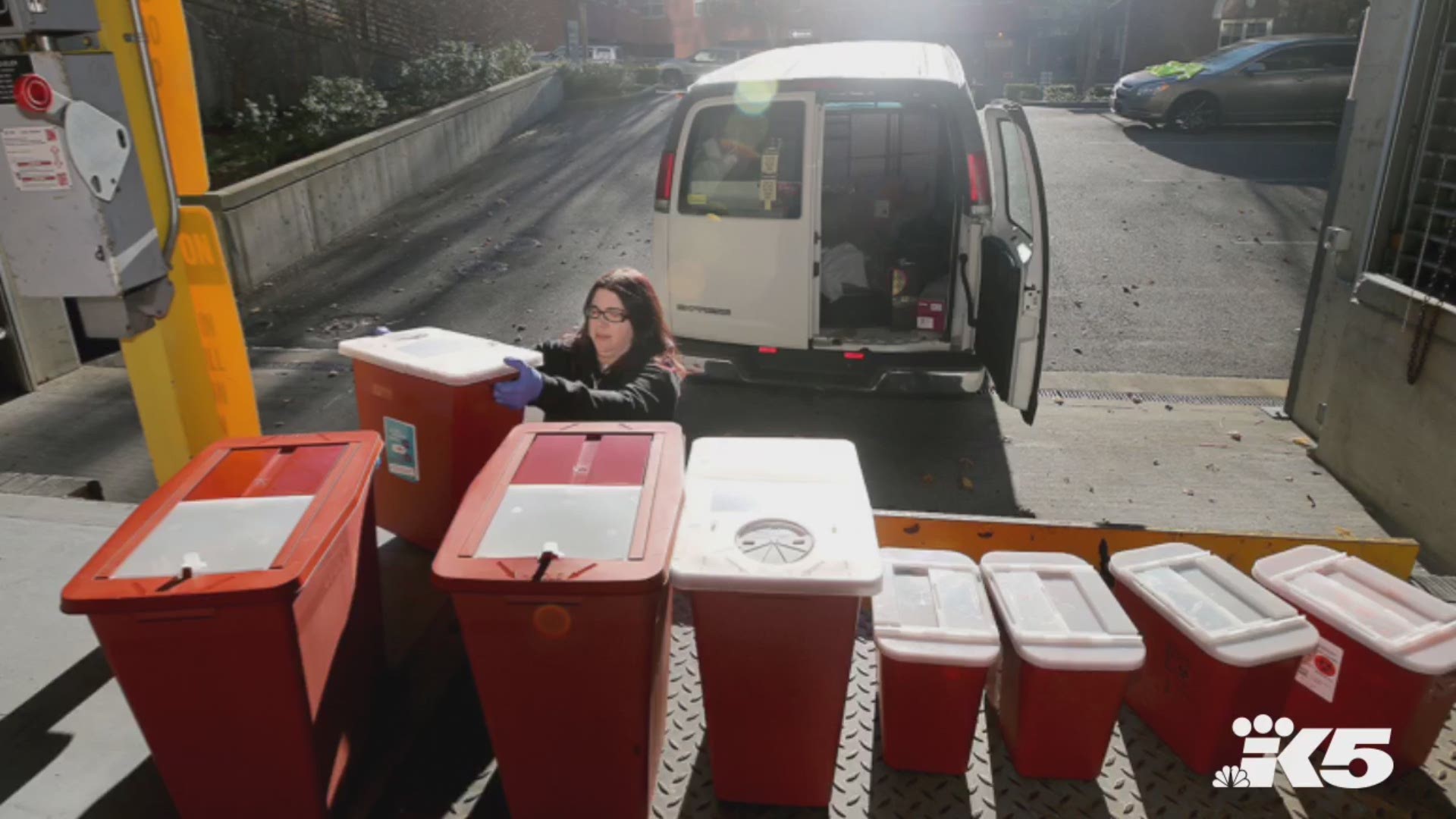BREMERTON, Wash. — Three mornings a week, Lisa Al-Hakim loads thousands of clean syringes into a plain, white van and rolls out into Bremerton to make house calls.
Al-Hakim is director of operations for the People's Harm Reduction Alliance, a Seattle nonprofit organization contracted to provide mobile syringe services in Kitsap. During a typical day, she'll make dozens of stops across the county, handing out clean syringes to intravenous drug users and collecting containers stuffed with used needles.
The mobile unit does much more than exchange syringes, Al-Hakim said. She distributes doses of the opioid overdose antidote naloxone, test strips for detecting fentanyl (an opioid drug that can be deadly in small doses) and preventive health supplies. After three years behind the wheel of the mobile unit in Kitsap, Al-Hakim said she has gradually gained the trust of the people she serves and frequently connects clients to services like substance use treatment, infection screenings and counseling.
"I think the most important thing I give is trust, and unconditional love and no judgment," Al-Hakim said before starting her rounds on Thursday. "For some, I'm the only person they will see all month."
Public health agencies across the country have adopted syringe exchanges as a science-based strategy for reducing the spread of infectious diseases, especially HIV and hepatitis, which can be transmitted between people who share needles. Exchanges also provide a link to ongoing services and a tool for curbing the destructive impact of the national opioid crisis, according to the Centers for Disease Control and Prevention.
Demand for clean needles has skyrocketed in Kitsap, where the exchange distributed and collected more than 1.8 million syringes in 2017, according to estimates from Kitsap Public Health District, which contracts for the mobile syringe services in the county and hosts a stationary exchange in downtown Bremerton.
But as utilization of the program soars, Kitsap's syringe service is rolling toward an uncertain future.
Complaints have risen over discarded needles littered in public places, and elected officials are questioning the effectiveness and ethics of the program. The exchange is also running in the red, with state and local funding covering only $200,000 of the $300,000 cost in 2018.
A task force met this fall to discuss issues associated with syringes and exchange services. Health district staff will present recommendations for the future of the exchange at a health board meeting on Jan. 8.
Bremerton Mayor Greg Wheeler, who serves on the health district board and participated in the task force, said he's heard reports of a surge in discarded needles on streets and in parks. He worries a publicly funded program could be perpetuating illegal drug use in the city.
"That really disturbs me," Wheeler said. "I'm looking for evidence that that's not happening."
Wheeler has joined Poulsbo Mayor and Health Board chair Becky Erickson in advocating for a model that would relocate syringe exchange services to clinics, where medical and behavioral health care are available. Erickson said the exchange needs to do more to get people into treatment.
"I want to see the people who are taking those needles get into treatment and get the medical attention they need," Erickson said. "We need to get them into treatment and not just trade needles back and forth."
Both mayors say they appreciate the importance of the program in preventing disease and want existing syringe services to continue until a new model is adopted.
Organizers of the Kitsap exchange believe the program collects the vast majority of the syringes it distributes — if not more. A conservative estimate indicates the exchange will collect about 99.5 percent of the roughly 2 million syringes distributed in 2018. But because there is no practical way of tracking syringes doled out through the program, and no safe means to count the used syringes turned in, it's virtually impossible to show that syringes dispersed by the exchange aren't being illegally dumped.
"That's the trigger point for this discussion," health district administrator Keith Grellner said. "If we could eliminate needles being dropped in the environment, all the other concerns we've heard — we could work through a lot of them. Because we can't assure that, it's put the district and this program in a really precarious position."
Health officials are concerned a rollback of clean syringe services could lead to outbreaks of disease, including HIV. Creating additional barriers to accessing syringes could also sever a trusted connection to services for people who might otherwise not engage in traditional health care, health district community health director Katie Eilers noted.
"We're very concerned about people being isolated even more than they already are," Eilers said.
Shilo Murphy, executive director of the People's Harm Reduction Alliance, was blunt in his assessment. Reducing mobile syringe services in Kitsap would be "catastrophic" to those it serves, he said.
"People miss the fact that these are people's sons and daughters and moms," Murphy said.
Supported by science
Syringe exchanges aren't a new concept.
One of the oldest in the country began in Tacoma 30 years ago in response to the HIV epidemic. A 1992 Washington Supreme Court decision upheld the ability of local health jurisdictions to authorize syringe exchanges.
Emalie Huriaux with the state Department of Health said numerous studies have reinforced the benefits of clean syringe services.
"They are extremely well-researched," Huriaux said.
Studies are conclusive on several key points, according to the Centers for Disease Control. Syringe exchange programs are successful in reducing the prevalence of blood-borne disease, notably Hepatitis C and HIV, among people who inject drugs. People who access syringe exchanges are five times more likely to seek treatment for substance use disorder and 3.5 times more likely to stop injecting drugs.
Research has also shown exchanges do not increase illegal drug use in communities where they are established, according to the Centers for Disease Control. A study published in the journal Drug and Alcohol Dependence in 2012 compared San Francisco, which had a long-running syringe exchange program, to Miami, which did not allow exchanges. The study found eight times more discarded syringes in Miami — the city without the exchange.
"Communities with exchange programs have less improperly discarded syringes than communities without," Huriaux said.
Though not conclusively studied, Huriaux said complaints of discarded needles appear to increase alongside rises in homelessness. Syringe exchanges in many places are experiencing pushback as the state confronts a housing crisis, alongside an opioid crisis.
"What's happening in Kitsap is mirrored in other places in Washington and in the country," Huriaux said.
Mounting concerns
Research pointing to a reduction in syringe litter from exchange programs may not be reassuring to Bremerton city staff, who say discarded needles have become a near-constant hazard.
"We find dozens per day," Bremerton parks director Jeff Elevado said. "Our biggest concern, of course, is exposure to people who use the parks and exposure to our staff who have to handle these things."
Those fears were realized earlier this year when a parks worker was stuck by a dirty needle. Employees receive training for handling sharps and carefully collect the syringes in secure containers, but Elevado said the abundance of needles has become a "stressor" for staff.
"It's so common to us, it's almost like picking up a candy wrapper," he said. "We just know we're going to find them."
Elevado said the surge in littered syringes does seem to have occurred in tandem with a "steep increase" in homeless encampments and people lingering overnight in city parks, which officially close at dusk. In the past, the parks department installed sharps disposal containers in bathrooms but determined the containers led to bigger problems.
"We've found they've become a place for IV drug users to break into to access needles," Elevado said.
Mayor Wheeler said the sheer volume of syringes distributed by the exchange leads him to believe the service is contributing to the illegal dumping of needles.


"That tells me that a lot of these needles that we're finding have got to be originating from the health district," he said.
Outside of city limits, littered syringes have been a nuisance in county parks in past years. This year, reports of discarded needles dropped off drastically, said Dori Lechner with the county parks department. Lechner said the department has had only a half-dozen reports of littered sharps in 2018 — a strange and welcome reversal.
"Normally we find them everywhere," she said. "I can't say why that's changed."
Murphy with the People's Harm Reduction Alliance noted that IV drug users can acquire syringes from many sources, including pharmacies. He believes the best way to reduce discarded syringes is to revise laws that make it illegal for people to carry used drug needles — a major motivation for users to dump dirty syringes — and increase syringe exchange services to reach more people.
"We're incredibly good at collecting syringes," Murphy said.
He hopes Kitsap leaders will find ways of supporting syringe services while adding more treatment options.
"We want to work with everyone, we want to collaborate with everyone and we know we're not the only solution," Murphy said.

